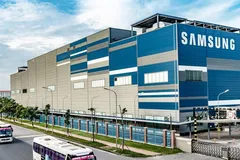
Bank maintains growth
According to financial experts, the banks have a strong capital base, reflected by low leverage ratio and high CAR Basel II that will ensure high loan growth within the bank group. This is a positive aspect when lending to customers which is still the main source of income for banks, and expanding credit will allow banks to cross-exchange products such cards, payment transactions, insurance, and thereby improve service income. Besides, with a relatively low valuation, P/B in 2020 will be about 1.0-1.4x and ROE from 18-20%, which is also another advantage for banking groups. It should be noted that most listed private banks have no location for foreign investors.
Among banking stocks, ACB was evaluated positively because it focused heavily on inherent strengths, instead of expanding into high-risk areas, with healthy liquidity and reasonable capital base. In addition, the revenue growth potential from "bancassurance" is expected to be driven by a recently signed non-exclusive insurance distribution contract with Manulife. This will be a new driving force for earnings growth, especially interest income that is difficult to grow strongly in the short term. Top asset quality and the ability to control capital costs well, together with high ability to recover bad debts, are important advantages for ACB to maintain stable profit growth in the coming period.
Another notable bank stock is Vietnam Prosperity Joint Stock Commercial Bank (VPB). This bank’s Income Statement in nine months of 2019 showed a strong recovery in consumer lending segment through its subsidiary FE Credit. In particular, VPB announced consolidated pre-tax profit of about VND 7,200 bn (up 17.4%) and completed 76% of the year plan. Excluding the extraordinary income recorded in the same period in 2018, VPB nine-month profit before tax increased by more than 25%. Recently, VPB bought 50 million treasury stocks so the equity dropped by VND 1,100 bn. However, this doesn’t affect too much CAR Basel II for VPB because the income in the fourth quarter will offset the decrease. According to forecasts by Viet Dragon Securities Corporation (VDSC), VPB profit before tax for the whole year is estimated at VND 9,948 bn (up 8% and exceeding 5% of plan). VPB will be trading at P/B 2020 at 1.0 x, with the valuation relatively attractive, and two-digit growth in net income and ROE of 20% over the next two years.
Real estate overcomes difficulties
The net profit after tax in the third quarter for the real estate industry recorded a growth of 18%, most of it coming from Vinhomes JSC (VHM). If excluding the increase at VHM, the net profit after tax in the real estate industry would decrease by 4%. The reason is the decrease in profit of some big companies, such as NoVa Land Investment Group Corporation (NVL), Nam Long Investment Corporation (NLG), Vingroup Joint Stock Company (VIC) and LDG Investment Joint Stock Company (LDG). Even so, the sector’s Income Statement in nine months of 2019 was still positive, as revenue and profit grew by 24% and 28%, respectively. Even by excluding Vingroup stock, VHM and Vincom Retail (VRE) revenue and net profit after tax of nine months still increased by 32% and 15%, respectively.
Although the profit in the third quarter was not as expected, leading companies such as VIC, NVL, and NLG are still stocks that investors are interested in due to their financial potential and large land fund. At the time when projects in Ho Chi Minh City are running legally slow, owning a full legal land fund is considered as the main growth driver for companies. For example, in the case of NVL with a housing development strategy in Ho Chi Minh City using the existing land fund of up to 670 ha. However, NVL will not use all of its resources to deploy simultaneously but promote investment in phase 2 of some old projects. This strategy will help NVL to reduce pressure on cash flow but still achieve good revenue and profit. In addition, NVL has prepared a land fund of more than 2,000 ha in the southwestern provinces with potential for tourism development.
Similarly, NLG owns a large and prime location land fund in Ho Chi Minh City, Dong Nai, Long An and Hai Phong Provinces, with good access to capital and safe capital. These factors help NLG to have motivation for growth in the future. Currently, NLG focuses on developing affordable housing projects in response to real housing needs. The Mizuki Park project in Ho Chi Minh City of 26.4 ha. provides 1,200 apartments and Waterpoint project in Long An of 355 ha. started its phase 1 implementation with a scale of more than 3,000 products, which is expected to bring significant profits for NLG. The large land fund is an advantage for developing future projects of LDG. In the past three years, LDG has made very strong developments, while total assets increased by 108% due to the continuous transfer of projects and the addition of new land funds. These land banks helped LDG to have new projects in the medium term. Estimated profit from these real estate projects for LDG are around VND 2,200 bn.
In 2020, the stock market will welcome Hung Thinh Land which is attracting the attention of investors, with a series of hit projects over time. This is a member of the Hung Thinh Group whose main activities lie in the field of brokerage. This business has been adding major project development areas to its parent company since the end of 2018. With this decision, Hung Thinh Land is ready to invest in a series of projects in Ho Chi Minh City and the provinces of Binh Dinh, Khanh Hoa, Binh Thuan, and Ba Ria-Vung Tau.




















